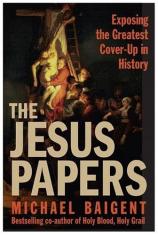The Jesus Papers: Exposing the Greatest Cover-up in History
Review
The Jesus Papers: Exposing the Greatest Cover-up in History
As I dutifully filled out all the essential information that
classifies a book review --- title, publisher, and so on --- I
suddenly winced at having to plug in the term "nonfiction" under
Michael Baigent's hotly controversial THE JESUS PAPERS.
It's not what you might think, however. In fact, it's not what the
inherently biased seminary student part of me thought at first,
either. After traveling with this sometimes irascible, often
charming spiritual adventurer through the better part of 300 pages,
I found myself emerging from the archaeological dust as neither
convert nor combatant; certainly not what I expected upon starting
the journey.
Instead, I feel as if I've experienced something that is part
autobiography, part "Indiana Jones"-style travelogue, part
competitive scholarly report, part historical fiction, and part
poetic speculation --- with a considerable measure of
anti-authoritarian rant (some of it quite justified) holding it all
together.
Now there are plenty of folks offering up opinions on what
Baigent's latest book is not, and I don't intend to crowd
that end of the critical field. But even though I'm glad I read THE
JESUS PAPERS on its own merit, I would be hard pressed to say what
genre of work it really is, or who its primary audience should be.
And in this day and age of post-modern cynicism over all things
concerning religious institutions and beliefs, those are important
issues.
If Baigent is aiming his theories about an Egyptian-trained
mystic/messiah called Jesus, who was "rescued" from crucifixion and
reportedly still alive as late as 45 AD, at academics, students and
theologians, he has somewhat missed the mark, for most of what he
proposes, relates, contests and re-examines is simply old news. For
half a century and more, it's all been lectured on, argued over,
footnoted, revised, and continually reconsidered in the light of
newer understanding, just as any and all information should be.
It's a well-worn truism to say that yesterday's historical facts
often become today's fiction --- and vice-versa.
And if he is also concerned (as he's often stated in press
interviews) with the conscientious layperson who is trying to
discern between faith and fact, THE JESUS PAPERS may prove to be
just too much concentrated and diverse material to take in all at
once for those without the mixed blessing of a formal theological
education.
That leaves Baigent and his work resting somewhat uneasily (for me,
anyway) in the weird literary twilight zone of populist history
that academics and the media find easy to dismiss and
denigrate.
The actual "Jesus papers" --- a couple of briefly seen
letter-fragments written to the Sanhedrin by someone who
might have been Jesus --- fill only a few inconclusive pages
near the beginning and end of a book whose entire raison-d'etre
rides on them. So as a revelation of any great importance to
biblical scholarship, they more or less bombed.
But even acknowledging the author's self-indulgent wanderings,
theoretical dissonances, vague allusions and frequently unsupported
assumptions, the book needs to be taken more seriously than
that.
For example, the stories around the story are another matter.
Baigent's journeys and personal experiences at a variety of ancient
mystic sites are not only well told but often passionately and
convincingly presented. Agree with him or not, he's no dilettante
in the labyrinthine and sometimes life-threatening world of field
archaeology; for him, the past truly lives, with or without the
populist's ego.
Baigent also makes both general and professional readers more
urgently aware of the dangers facing numerous historical artifacts
(both writings and objects) that have become borderless
international pawns, vulnerable to black-market thieves, secretive
speculators, conservative church censors, political opportunists,
and the inevitable ravages of time.
In short, if nothing else THE JESUS PAPERS reaffirms everyone's
right to question any authorities or institutions that would have
us categorically and uncritically believe one thing or another,
simply on their say-so. What Baigent has called "the greatest
cover-up in history" is in no small measure partly Christians' own
doing as passive recipients of 2,000-year-old doctrines and
traditions that have been shown by numerous preceding scholars to
have little or no relationship to actual biblical records, gospel
teachings, or cultural realities.
Michael Baigent did not change the core of my
Protestant/Lutheran/Anglican theology, but he did plant a few more
burrs under my saddle about why I believe what I do and whether the
cracks in that belief are there because more light needs to get
in.
Reviewed by Pauline Finch (paulinefinch@rogers.com) on January 22, 2011
The Jesus Papers: Exposing the Greatest Cover-up in History
- Publication Date: April 1, 2006
- Genres: Nonfiction
- Hardcover: 336 pages
- Publisher: HarperOne
- ISBN-10: 0060827130
- ISBN-13: 9780060827137




